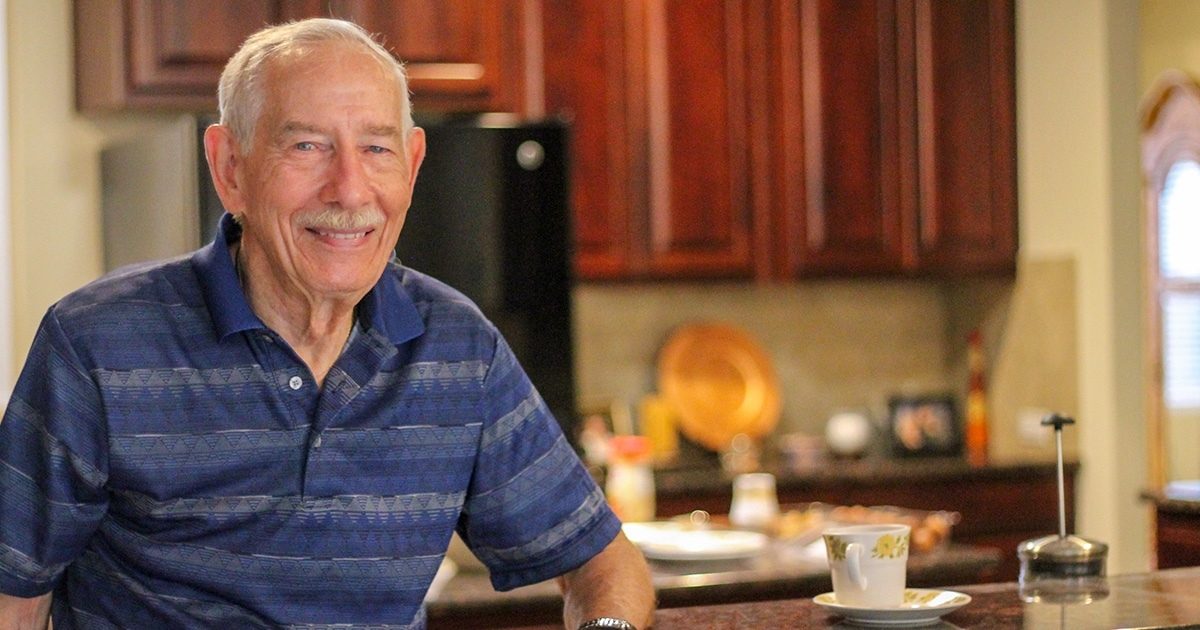20 Years of Misdiagnosis Fixed With One Surgery
Written by: Lauryn Feil
Reviewed by patient and Tripp Buckley, MD

Buddy lived with what he was told were stomach ulcers for over 20 years. He changed his diet, modified his eating habits and was on medications to treat the problem. Despite these changes, nothing ever seemed to work for long and the painful GERD symptoms always returned. He explained his symptoms in a casual conversation with a tennis friend, a cardiologist, who suspected that his problem may be related to a hiatal hernia. After visiting a gastroenterologist, the diagnosis was confirmed; Buddy did in fact have a hiatal hernia, not stomach ulcers. His stomach was bulging through his diaphragm and into his chest, which was the real cause of his heartburn and pain.
Buddy, eager to solve the actual problem that had been misdiagnosed for so long, asked what he needed to do. His doctor gave him two options: one was a surgery called a hiatal hernia repair with Nissen fundoplication, where the stomach is brought back down into the abdomen and the upper part of the stomach is wrapped around the lower end of the esophagus to help prevent acid reflux. The other option was lifestyle changes and drug therapy, as he had already been doing. His doctor urged against the surgery saying it might be dangerous at his age. So, taking his doctor’s advice, Buddy changed his eating habits yet again and began a higher dose of daily proton pump inhibitors to keep heartburn symptoms at bay.
Taking Action Towards Heartburn Relief
For three years Buddy treated his hiatal hernia this way until it once again was unresponsive to treatment and the symptoms returned. His hiatal hernia had also continued to increase in size, leading to issues with regurgitation while eating. At this point, Buddy was desperate for a change. “The treatment helped for a little while, but the symptoms started returning and I really just wanted to fix the root cause of the problem, I wanted the surgery,” says Buddy.
His gastroenterologist connected him with Tripp Buckley, MD, Medical Director and surgeon of the Heartburn and Esophageal Disorders Center clinical practice within Digestive Health, a clinical partnership between UT Health Austin and Seton Ascension. After meeting with Dr. Buckley, Buddy felt reassured that the Nissen fundoplication surgery was safe, effective and would solve his problems. “He explained everything very thoroughly and I really felt like I could trust him,” says Buddy.
In the 1950s, when the Nissen fundoplication surgery was first described, it involved a large incision in the upper abdomen or chest and was often very invasive and painful to patients, leading to many potential complications. Today, the surgery is done completely laparoscopically, allowing for faster recovery times, less pain and significantly fewer complications. Dr. Buckley considers it a routine and practical surgery in his practice
In May 2018, Buddy was scheduled for surgery and he just so happened to be one of Dr. Buckley’s first surgical patients here at UT Health Austin. “I wanted to get it done as soon as possible, so when Dr. Buckley’s schedule opened up I asked for a spot right away,” he says.
The day of Buddy’s surgery, everything went smoothly and he left the OR with a few small incisions and minimal pain. In the recovery room, Dr. Buckley explained everything that went on throughout the operation and told him that he shouldn’t need to take any heartburn medication anymore and that he can throw away the pills at home. “I was extremely happy I went through with it and felt so fortunate to have Dr. Buckley on board. I don’t recommend doctor’s often, but I would highly recommend him,” says Buddy.
Achieving Food Freedom
After over 20 years of suffering, Buddy is happily living heartburn and pain free, he eats whatever he wants and doesn’t have to worry about limiting his lifestyle so strictly anymore. “I can eat ceviche, I can eat anything out there, and there’s no symptoms whatsoever,” Buddy explains happily. Because of the success with surgery, he has chosen to continue using UT Health Austin for his routine GI needs. “I have never considered myself sick or unhealthy, this was just a problem that I needed to solve and now I’m happy to say I have moved on from it,” he says.
If you experience GERD symptoms more than twice a week or continue to have symptoms and/or develop new or worsening symptoms while on medication, then it may be time to see your doctor or a specialist.
To learn more about Digestive Health or to schedule an appointment, click here or call 1-844-442-8784.